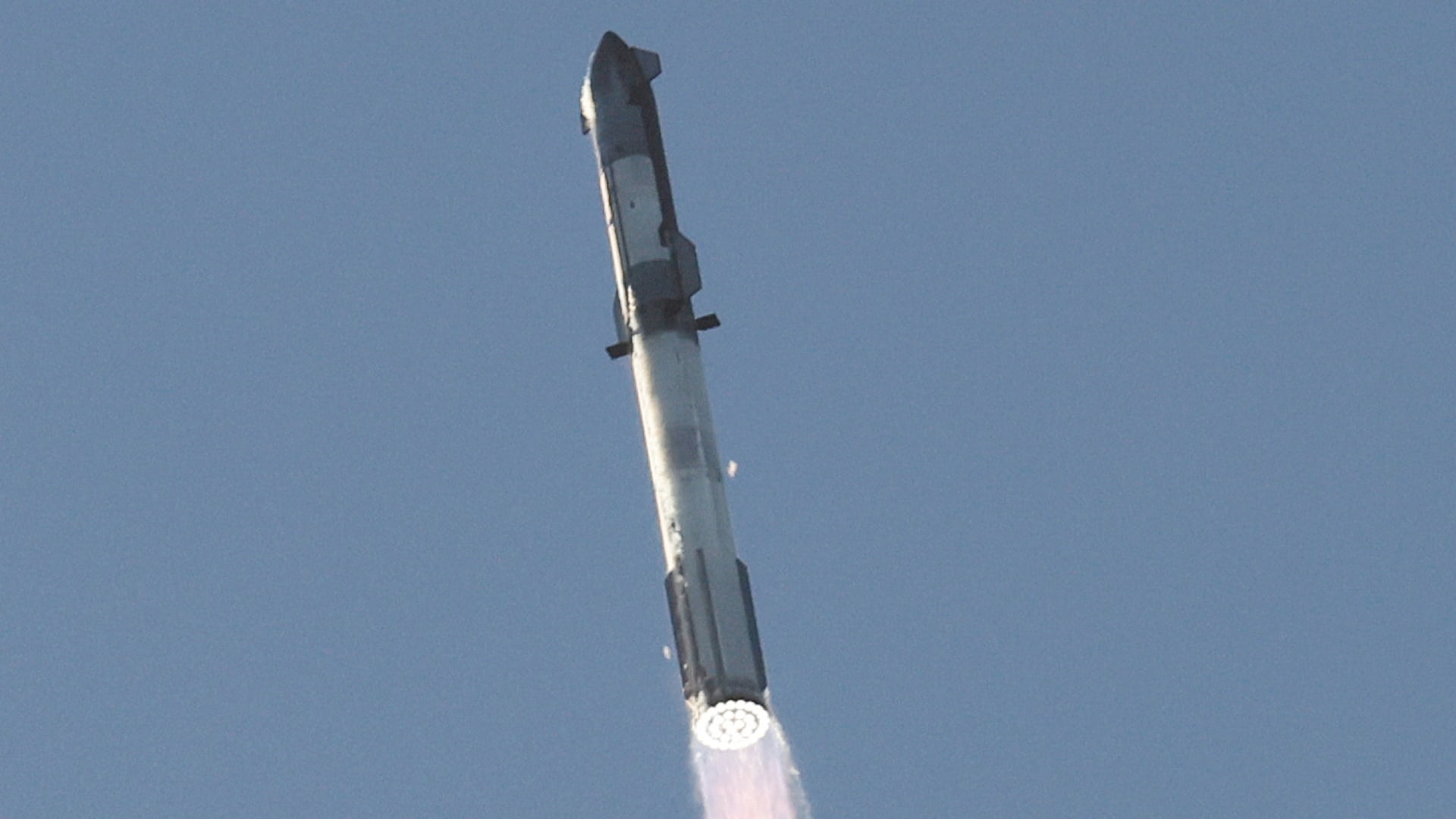I might get in via a private fund. What are the latest financial and valuation projections for SpaceX/Starlink?
SpaceX valuation climbs to $180 billion
The valuation of Elon Musk's SpaceX hit $180 billion based on an ongoing secondary share sale, CNBC confirmed Wednesday.www.cnbc.com
$180 billion US?. And shares will be sold at $97 each but not to raise any additional funds.
Welcome to Tesla Motors Club
Discuss Tesla's Model S, Model 3, Model X, Model Y, Cybertruck, Roadster and More.
Register
Install the app
How to install the app on iOS
You can install our site as a web app on your iOS device by utilizing the Add to Home Screen feature in Safari. Please see this thread for more details on this.
Note: This feature may not be available in some browsers.
-
Want to remove ads? Register an account and login to see fewer ads, and become a Supporting Member to remove almost all ads.
You are using an out of date browser. It may not display this or other websites correctly.
You should upgrade or use an alternative browser.
You should upgrade or use an alternative browser.
SpaceX does not provide any information except to the few repeat primary institutional investors and they keep it closely guarded. All SPEs and private funds have no idea and put together guesstimates based on meager public information. I saw one fund’s deck and I could have done a better job at it, honestly.I might get in via a private fund. What are the latest financial and valuation projections for SpaceX/Starlink?
Right now, know that Starlink is already profitable, and they probably can grow Starlink revenues by 5x. Falcon 9 is of course profitable, and revenue for that continues to grow, albeit slowly. SpaceX continues to grow govt and military contracts. All of this is funding the Starship program which will then reduce their costs even more when it slowly takes over Falcon launches. The Mars missions will be break even initially as people and governments will pay for transport, but eventually Mars will be a huge money maker. Elon estimates the Mars endeavor will cost around 0.5% of world GDP. Now, that’s spread over 50-100 years, but SpaceX will reap quite a bit of that.
Investing in SpaceX, even now with 1 & 20 fund costs, is a good investment IMHO.
Last edited:
It was apparently once possible to obtain SpaceX shares through Forge Global (apparently through employee sales), but they don't list them at their web site anymore.SpaceX does not provide anything except to the few repeat primary institutional investors and they keep it closely guarded.
Have you contributed to such funds? If so, is it standard to have an unlimited investment period (zero exit option until IPO/acquisition)?Investing in SpaceX, even now with 1 & 20 fund costs, is a good investment IMHO.
What would be an acceptable deal structure, nowadays (contribution fees, annual management fees, and carried interest split)? We can discuss this in private of course.
Have you contributed to such funds? If so, is it standard to have an unlimited investment period (zero exit option until IPO/acquisition)?
I’m not sure what this questions means?
What would be an acceptable deal structure, nowadays (contribution fees, annual management fees, and carried interest split)? We can discuss this in private of course.
A current fund I ran across was a special purpose entity that only held SpaceX shares. They charge 1% per year in fees, and 20% of profit on exit. Dont know if there are better/worse deals out there. Oh, minimum investment is probably $200K or so.
Plaid Trader
New Member
The latest valuation is at $225 billion per this Bloomberg article:I might get in via a private fund. What are the latest financial and valuation projections for SpaceX/Starlink?
Ferrying people and equipment to/from Mars.How?
EVer Hopeful
Active Member
Robertj
Member
I wonder how far away this is ……..2024 ?

 www.teslarati.com
www.teslarati.com

Elon Musk talks Starlink IPO
Just months after pledging to prioritize retail investors in Starlink’s future IPO, SpaceX CEO Elon Musk has noted that the satellite constellation will be listed publicly once the cash flow of the internet service becomes predictable. Such a move would allow retail investors to hold a part of...
I think 2-3 years away still.I wonder how far away this is ……..2024 ?

Elon Musk talks Starlink IPO
Just months after pledging to prioritize retail investors in Starlink’s future IPO, SpaceX CEO Elon Musk has noted that the satellite constellation will be listed publicly once the cash flow of the internet service becomes predictable. Such a move would allow retail investors to hold a part of...www.teslarati.com
I wonder how far away this is ……..2024 ?
Forgive my Slick Willy paraphrase, but it depends on what one's definition of "predictable" is. I'd contest that it largely is already. The infrastructure is pretty mature (obviously they're still building out V2M, but they can also do basic math on burn rates) and the recurring cost to maintain infra (launching more sats to replace dying ones, etc.) is pretty straightforward. The cost to buildout gateways is understood. The unpredictable ramp on users is in the past; the future take rate should be reasonably calculable.
The fundamental issue--and you can go back years in this forum and find I've made countless similar posts so sorry about beating the horse here--is that the practical market opportunity for Starlink has always been a) those who do not have reasonable terrestrial service AND b) those who can afford to pay for connectivity service. Look around the world and there's not actually a ton of material revenue generating opportunity there beyond folks who already pay the stalwart space industry for shitty satellite internet. So, right now, Starlink is more or less resigned to playing at being a big fish in a small pond. They're certainly doing an excellent job at it (mind, fish in a barrel isn't exactly difficult; of COURSE Carnival wants to provide better-than-dialup service to their customers), but the cold reality is that there's really not a ton of growth opportunity to expand well beyond what SX is doing now.
If you're looking for a step function in the above, which IMO is really what Elon is talking about with "predictable", it is once there's a critical mass of V2 sats on orbit. To get there we need a properly operational SS and a coupled thousand V2's distributed fairly symmetrically. (Looking at SS development pace, I'd probably pin this toward the end of the decade--maybe 2028-2029?). The big enabler here is that the bigger V2 satellites will have bigger antennas and, because Physics Is, those bigger antennas can form smaller beams. Smaller beams means SX will be able to provide significantly more capacity to a given area on the ground and THAT means they can provide [acceptable] service to a larger number of customers. Assuming SS+V2 can enable a lower per-capacity-unit cost than the current F9+V2M burn rate (which they will ultimately achieve, though its not clear exactly when), this will allow SX to become more price competitive with the terrestrial services and thus start to convert some of the comcast/spectrum/etc customers out there that are just happy to spend ten bucks less a month.
The big caveat here is that, in general, "better" starlink service than what's currently provided (more capacity and/or lower latency) ISN'T much of a needle mover when it comes to appealing to the majority of terrestrial service subscribers. Sure there are folks that are happy to pay more for better service, but for the lion's share of revenue generating customers, It really all boils down to the bottom line of "are you cheaper than the other service?". THAT's the major growth opportunity for Starlink.
L
Linkmeup
Guest
Q - is there a future in construction of new Starbases worldwide? Especially, the real estate markets around these Starbases?
Context: I remember watching this video 6 years ago -
...and seeing the progress of Starfactory, I'm wondering if SpaceX is going to start building more spaceports now that the launch capability of Starship and the launch/land/reusability of Falcon 9 is successful. There's not enough Starbases to go to Mars and Earth-to-Earth to launch all at one given moment. At one point in time, Elon Musk said there'd be oil rigs repurposed as Starports, but I think those plans have changed.
Context: I remember watching this video 6 years ago -
...and seeing the progress of Starfactory, I'm wondering if SpaceX is going to start building more spaceports now that the launch capability of Starship and the launch/land/reusability of Falcon 9 is successful. There's not enough Starbases to go to Mars and Earth-to-Earth to launch all at one given moment. At one point in time, Elon Musk said there'd be oil rigs repurposed as Starports, but I think those plans have changed.
This is good news if the $225B valuation is true.
I think 2-3 years away still.
I agree with Cosmacelf, however Chamath Palihapitiya said 2024 in January of this year. I'd think there'd be a meaningful start with T-Mobile and a window on that income/growth before the IPO.I wonder how far away this is ……..2024 ?

Elon Musk talks Starlink IPO
Just months after pledging to prioritize retail investors in Starlink’s future IPO, SpaceX CEO Elon Musk has noted that the satellite constellation will be listed publicly once the cash flow of the internet service becomes predictable. Such a move would allow retail investors to hold a part of...www.teslarati.com
I'm in SpaceX under terms similar to these, have been for 3+ years. I asked if I could pay for the fees in cash rather than shares...no.I’m not sure what this questions means?
A current fund I ran across was a special purpose entity that only held SpaceX shares. They charge 1% per year in fees, and 20% of profit on exit. Dont know if there are better/worse deals out there. Oh, minimum investment is probably $200K or so.
I see them on Forge, though they do not appear to be actively selling at present.Btw, if anyone knows of a similar fund that is set up to invest in Anduril shares, let me know.
Yeah that's the thing about these private companies, you have to catch them when someone is doing a block sale.I see them on Forge, though they do not appear to be actively selling at present.
Similar threads
- Replies
- 12
- Views
- 584
- Replies
- 0
- Views
- 167
- Replies
- 24
- Views
- 890
- Replies
- 12
- Views
- 895
- Article
- Replies
- 18
- Views
- 4K


